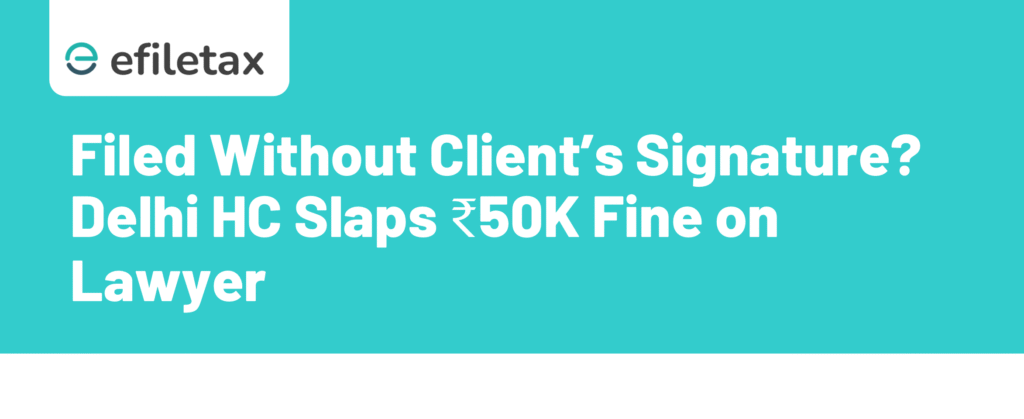
Delhi HC Penalty Highlights Need for Signature Compliance in Petitions
The Delhi High Court imposed a cost of ₹50,000 on a lawyer and petitioner for filing a writ petition without the litigant’s signature—a basic procedural lapse that triggered judicial rebuke.
This incident highlights a critical but often overlooked compliance requirement in legal filings: the necessity of the petitioner’s own signature on affidavits and pleadings.
What Happened in This Case?
- A lawyer filed a PIL seeking action against unauthorised construction in Delhi.
- The petition was signed only by the advocate, not the petitioner.
- The Bench observed this was a clear procedural defect and not curable at the hearing stage.
- ₹50,000 was imposed as cost, to be deposited with the Delhi High Court Mediation and Conciliation Centre.
Why Signature Matters in Legal Petitions
According to the Code of Civil Procedure and principles laid down by Indian courts:
- A petition must be signed and verified by the petitioner under oath.
- Legal representatives (including advocates) cannot substitute the litigant’s signature.
- Filing a petition without a signature may render it defective or even non-maintainable.
Legal References and Precedents
- Rule 1, Order VI of CPC: Pleadings to be signed by parties and their pleaders.
- Supreme Court in S.P. Anand v. H.D. Deve Gowda (1996): PILs require bona fide petitioners with authentic signatures.
- Delhi HC Practice Directions: Affidavits filed with petitions must be signed and attested per High Court Rules.
Expert Insight: A CA or Legal Tip
Practical Tip:
“Always verify client signatures on affidavits and declarations. A missing signature may seem minor but can lead to dismissal, costs, or contempt. Use a compliance checklist before filing.”
— Legal Associate, Efiletax Partner Firm
What It Means for Tax and Legal Practitioners
This order sets a strong message for:
- Tax consultants filing writs or representations before tribunals.
- Litigation CAs and CS professionals engaging in quasi-judicial forums.
- Startup founders and SMEs who authorize legal reps but forget procedural formalities.
Quick Checklist: Filing a Valid Petition or Application
| Requirement | Mandatory? | Remarks |
|---|---|---|
| Petitioner’s original signature | ✅ | Notary or self-attested if affidavit needed |
| Advocate’s signature | ✅ | Alongside, not in place of petitioner |
| Affidavit from petitioner | ✅ | Under oath for factual statements |
| Filing Vakalatnama | ✅ | Required when advocate files on behalf |
| Attested enclosures/documents | ✅ | Especially for evidence or claims |
SEO-Friendly FAQ Section
Q1: Is a petition valid without the petitioner’s signature?
No. It is treated as defective and can be dismissed unless rectified timely.
Q2: Can an advocate file a petition alone for the client?
Only with proper authorisation and the client’s signature. Both are mandatory.
Q3: What is the penalty for procedural lapses in petition filing?
Courts may impose fines (like ₹50,000 in this case) or dismiss the petition entirely.
Summary
The Delhi High Court imposed ₹50,000 cost for filing a petition without the litigant’s signature. This reinforces that both lawyer and client must comply with procedural norms. Tax and legal professionals must ensure every affidavit and petition bears valid signatures to avoid rejection or penalty.